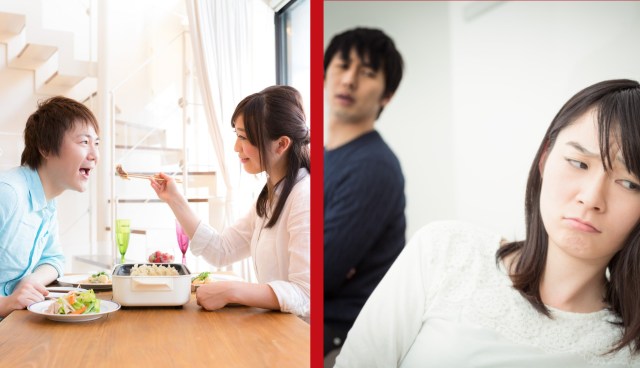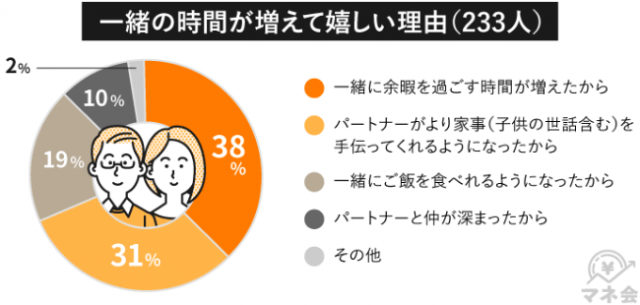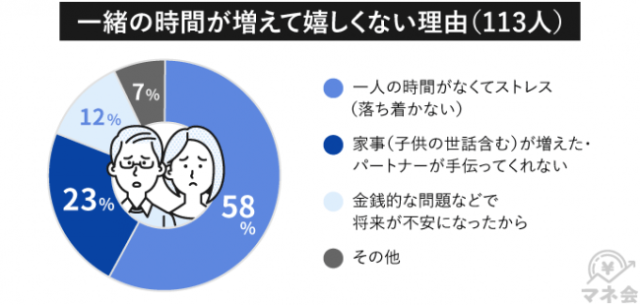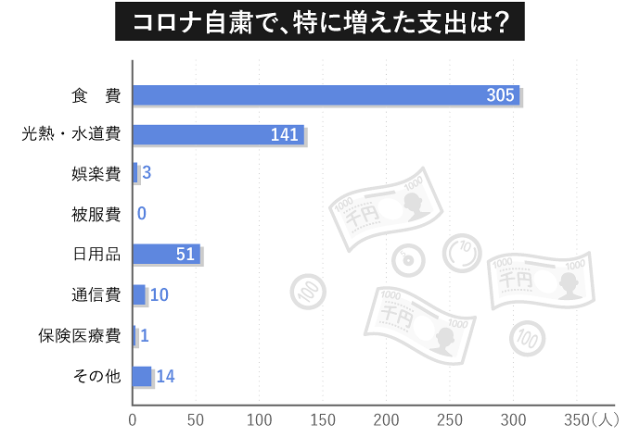
Survey examines how stay-home recommendations are affecting daily family life.
As Japan’s voluntary policy of “jishuku“, or self-restraint, continues, more and more people are working from home, and families are spending more time together than ever before. Since many people often had to work long hours and weren’t able to leave the office until late at night before the outbreak, this new arrangement could be either completely wonderful or surprisingly unpleasant for them and their families.
CyberOwl, owned by financial information site MoneyKai, wanted to know how families’ lives were being affected by the stay-at-home recommendations, so they asked 525 married women from across the nation in an online survey in April.
Fortunately, the majority of the respondents were glad to have their husbands home. Of the 346 women who said that they were able to spend more time with their husbands, 67 percent said that they’re happy about it. When asked the reason why, the most common response was that it was because they have more free time together (38 percent), while 31 percent were happy to have extra help around the house and with the children. Those two answers made up almost 70 percent of the responses.
▼ 19 percent answered that they’re happy because they can eat meals together, while 10 percent said that it’s because they became closer. Two percent marked “Other”.
However, 33 percent of women did say that they were unhappy spending so much time with their husbands. The majority of those said that it was because they felt stressed because they weren’t getting enough time to themselves or to relax (58 percent). 23 percent were unhappy because they felt their work load increased, or they weren’t getting help around the house. 12 percent were worried about money and the future.
Seven percent of the unhappy women selected “Other”. One of those responses was, “I have to face parts of his personality that I used to ignore.” Perhaps couples who hadn’t been able to spend as much time together before are learning who their spouses are for the first time, and that can take some adjustment.
Next, the 346 women who said they’re spending more time with their husbands were asked if how much their husbands are helping around the house has changed since quarantining at home. An impressive 81 percent of women said their husbands are helping out at home. Of those, 233 women said their husbands have always helped out at home, and about half of that number said that their husbands are helping more now than before. 48 women said that their husbands didn’t used to share the household responsibilities, but do now.
In contrast, about 20 percent of the respondents said their husbands have never helped around the house and still don’t, despite spending more time at home. Among those numbers, about half of those women were in their forties or older, which indicates that older men are less inclined to help with housework than younger men.
But the good news is that many respondents feel like they’ve gotten closer to their husbands since they’ve been staying home. Though about 61 percent of said their relationships with their husbands haven’t changed, about 30 percent said they have gotten closer or much closer with their husbands. Sadly, 29 respondents did say that their relationships got worse, and one said it’s gotten a lot worse; perhaps that’s because they didn’t have time to get to know each other before and are having a hard time getting along now. Hopefully these women are not in violent situations and the differences can be safely reconciled.
▼ From top to bottom: much closer, closer, no change, worse, and much worse
Finally, the women were asked how their financial situation has changed as a result of the stay-at-home recommendations. About 46 percent of the respondents said their household income has decreased. The majority of respondents said that their monthly income decreased by between 1 and 100,000 yen (about US$929). Some respondents’ incomes lowered by as much as 510,000 yen or more, so the pandemic appears to have had a serious affect on many families’ financial situations.
Participants were then asked if their family’s monthly expenditures have changed, and more than half of the respondents said yes. The majority said they’re spending more on food. That’s because of rising food costs and the fact that they’re cooking at home more as opposed to eating out as a family or individually, with lunch at the school cafeteria or restaurants near the office no longer an option. Another source of increased supermarket spending was husbands’ drinking at home instead of in bars with coworkers, and some also said their families are ordering more food for delivery.
▼ Many also said that the rising cost of their utilities was a major factor in increasing their expenses (from top to bottom: cost of food, utilities, entertainment, clothing, daily items, cellphone bills, insurance, and other).
However, in some cases their expenses have decreased. For example, they no longer have to pay for their kids’ after-school activities and don’t need to spend as much on clothes and beauty items. Plus, they are saving money overall by not going drinking parties, which are common for many Japanese companies and generally cost more than drinking at home.
Still, the added costs of living are rising, and with their household salaries taking a hit, many women are worried about their finances. Out of the 525 respondents. 87.1 percent that they are concerned about their families’ financial future. Though the government has disbursed some aid to families, if this situation goes on much longer, many could be facing dire economic circumstances.
So though the coronavirus has had a positive impact on some families because they get to spend more time together, many are worried about the future and whether they’ll be able to survive once the pandemic is over. Hopefully we can find a way to end the disease, or open up safely, so that people can begin to work again, while at the same time allowing workers the ability to continue spending time with their families.
Source: @Press
Top image: Pakutaso (1, 2) (edited by SoraNews24)
Insert images: @Press
● Want to hear about SoraNews24’s latest articles as soon as they’re published? Follow us on Facebook and Twitter!






 What’s the minimum amount of money Japanese women want their husbands to earn? Survey investigates
What’s the minimum amount of money Japanese women want their husbands to earn? Survey investigates Over 50 percent of single Japanese women in their 20s struggle to make ends meet, survey says
Over 50 percent of single Japanese women in their 20s struggle to make ends meet, survey says Is it OK to split the bill on a date in Japan? Survey asks what women and men of different ages think
Is it OK to split the bill on a date in Japan? Survey asks what women and men of different ages think Japanese husbands in survey say they do half the housework and childcare, wives say “Nope!”
Japanese husbands in survey say they do half the housework and childcare, wives say “Nope!” What’s the best way to close the gender gap in Japan? Japanese women weigh in
What’s the best way to close the gender gap in Japan? Japanese women weigh in Japan’s new difficult-to-drink-from beer glass protects your liver, but it’s a brutal experience
Japan’s new difficult-to-drink-from beer glass protects your liver, but it’s a brutal experience How to order snacks on a Shinkansen bullet train in Japan
How to order snacks on a Shinkansen bullet train in Japan New samurai glasses are Japan’s latest weird must-have souvenir
New samurai glasses are Japan’s latest weird must-have souvenir New Pokémon ice cream, dessert drinks, and cool merch coming to Baskin-Robbins Japan【Pics】
New Pokémon ice cream, dessert drinks, and cool merch coming to Baskin-Robbins Japan【Pics】 Doraemon found buried at sea as scene from 1993 anime becomes real life【Photos】
Doraemon found buried at sea as scene from 1993 anime becomes real life【Photos】 Burger King Japan suddenly adds Dr. Pepper and Dr. Pepper floats to its menu nationwide
Burger King Japan suddenly adds Dr. Pepper and Dr. Pepper floats to its menu nationwide Starbucks Japan welcomes alpacas for cute summer drinkware line【Photos】
Starbucks Japan welcomes alpacas for cute summer drinkware line【Photos】 High-fashion Totoro cuddle purse is like an elegant stroll in the forest【Photos】
High-fashion Totoro cuddle purse is like an elegant stroll in the forest【Photos】 Studio Ghibli hair accessories keep your style tidy with help from Kiki, Moro, Calcifer, and more
Studio Ghibli hair accessories keep your style tidy with help from Kiki, Moro, Calcifer, and more What if Sailor Moon characters were lingerie models? They’d look stunning like this 【Photos】
What if Sailor Moon characters were lingerie models? They’d look stunning like this 【Photos】 Nintendo history you can feel – Super NES, N64, and GameCube controllers become capsule toys
Nintendo history you can feel – Super NES, N64, and GameCube controllers become capsule toys Hello, cosmetics! Clinique teams up with Hello Kitty this summer for first-time collaboration
Hello, cosmetics! Clinique teams up with Hello Kitty this summer for first-time collaboration Demon Slayer: Kimetsu no Yaiba gets new roller coaster attractions and food at Universal Studios Japan
Demon Slayer: Kimetsu no Yaiba gets new roller coaster attractions and food at Universal Studios Japan “The most Delicious Cup Noodle in history” – Japan’s French Cup Noodle wins our heart【Taste test】
“The most Delicious Cup Noodle in history” – Japan’s French Cup Noodle wins our heart【Taste test】 Starbucks releases a cute Frappuccino and Unicorn Cake…but not in Japan
Starbucks releases a cute Frappuccino and Unicorn Cake…but not in Japan Kyoto Tower mascot termination reveals dark side behind cute Japanese characters
Kyoto Tower mascot termination reveals dark side behind cute Japanese characters McDonald’s Japan’s Soft Twist Tower: A phantom ice cream only sold at select branches
McDonald’s Japan’s Soft Twist Tower: A phantom ice cream only sold at select branches Yabai Ramen: What makes this Japanese ramen so dangerous?
Yabai Ramen: What makes this Japanese ramen so dangerous? Finally! Nintendo Japan expands Switch 8-bit controller sales to everybody, Online member or not
Finally! Nintendo Japan expands Switch 8-bit controller sales to everybody, Online member or not Japanese government wants to build luxury resorts in all national parks for foreign tourists
Japanese government wants to build luxury resorts in all national parks for foreign tourists To combat declining birth rate, Japan to begin offering “Breeding Visas” to foreigners
To combat declining birth rate, Japan to begin offering “Breeding Visas” to foreigners 10 things you should buy at 7-Eleven in Japan
10 things you should buy at 7-Eleven in Japan Studio Ghibli releases anime heroine cosplay dresses that are super comfy to wear
Studio Ghibli releases anime heroine cosplay dresses that are super comfy to wear Woman charged for driving suitcase without a license in Osaka
Woman charged for driving suitcase without a license in Osaka Studio Ghibli unveils My Neighbour Totoro miniature house model
Studio Ghibli unveils My Neighbour Totoro miniature house model Kyoto experiencing problems with foreign tourists not paying for bus fares, but not on purpose
Kyoto experiencing problems with foreign tourists not paying for bus fares, but not on purpose Fighting mild hunger with a Japanese soda that turns into jelly in the stomach【Taste test】
Fighting mild hunger with a Japanese soda that turns into jelly in the stomach【Taste test】 Studio Ghibli’s Howl’s Moving Castle tapestry unveiled in Japan for first time
Studio Ghibli’s Howl’s Moving Castle tapestry unveiled in Japan for first time McDonald’s new Happy Meals offer up cute and practical Sanrio lifestyle goods
McDonald’s new Happy Meals offer up cute and practical Sanrio lifestyle goods Sales of Japan’s most convenient train ticket/shopping payment cards suspended indefinitely
Sales of Japan’s most convenient train ticket/shopping payment cards suspended indefinitely Sold-out Studio Ghibli desktop humidifiers are back so Totoro can help you through the dry season
Sold-out Studio Ghibli desktop humidifiers are back so Totoro can help you through the dry season Japanese government to make first change to romanization spelling rules since the 1950s
Japanese government to make first change to romanization spelling rules since the 1950s Foreigner’s request for help in Tokyo makes us sad for the state of society
Foreigner’s request for help in Tokyo makes us sad for the state of society Ghibli founders Toshio Suzuki and Hayao Miyazaki contribute to Japanese whisky Totoro label design
Ghibli founders Toshio Suzuki and Hayao Miyazaki contribute to Japanese whisky Totoro label design Tokyo’s most famous Starbucks is closed
Tokyo’s most famous Starbucks is closed Princesses, fruits, and blacksmiths: Study reveals the 30 most unusual family names in Japan
Princesses, fruits, and blacksmiths: Study reveals the 30 most unusual family names in Japan Nearly half of survey respondents in Japan feel healthier since before COVID-19
Nearly half of survey respondents in Japan feel healthier since before COVID-19 Survey finds roughly one in four all-night Internet cafe customers in Tokyo is homeless
Survey finds roughly one in four all-night Internet cafe customers in Tokyo is homeless More than one in three Japanese working women in survey would rather be housewives
More than one in three Japanese working women in survey would rather be housewives Survey says more than 70 percent of Japanese people think gender inequality exists in Japan
Survey says more than 70 percent of Japanese people think gender inequality exists in Japan Survey shows that many Japanese business people’s sleep patterns have changed since teleworking
Survey shows that many Japanese business people’s sleep patterns have changed since teleworking Japanese employees show almost unanimous support for in-office romances in survey
Japanese employees show almost unanimous support for in-office romances in survey Survey asks Japanese women if they could marry a man who’s rich but ugly
Survey asks Japanese women if they could marry a man who’s rich but ugly Barely half of Japanese men in survey will give thank-you gift to women for Valentine’s chocolate
Barely half of Japanese men in survey will give thank-you gift to women for Valentine’s chocolate Survey reveals that Japanese women’s ideal husband is surprisingly ordinary
Survey reveals that Japanese women’s ideal husband is surprisingly ordinary Rate of young Japanese people who want to get married someday drops to lowest ever in survey
Rate of young Japanese people who want to get married someday drops to lowest ever in survey Only one demographic in survey is happy about Japan’s workplace obligation Valentine’s chocolate
Only one demographic in survey is happy about Japan’s workplace obligation Valentine’s chocolate Survey reveals most Japanese workers want to work from home at least twice per week
Survey reveals most Japanese workers want to work from home at least twice per week Get rid of bugs and score points with Japanese women in one fell swoop with the ami-ton maneuver
Get rid of bugs and score points with Japanese women in one fell swoop with the ami-ton maneuver Survey reveals Japan’s Generation Z dresses for social media, not for self-expression
Survey reveals Japan’s Generation Z dresses for social media, not for self-expression 31 percent of Japanese women admit to cheating on lover, six percent say they got caught【Survey】
31 percent of Japanese women admit to cheating on lover, six percent say they got caught【Survey】 How much money do you need to live in your own apartment in Japan?【Survey】
How much money do you need to live in your own apartment in Japan?【Survey】 Nearly 70 percent of young Japanese women self-identify as otaku in survey
Nearly 70 percent of young Japanese women self-identify as otaku in survey
Leave a Reply